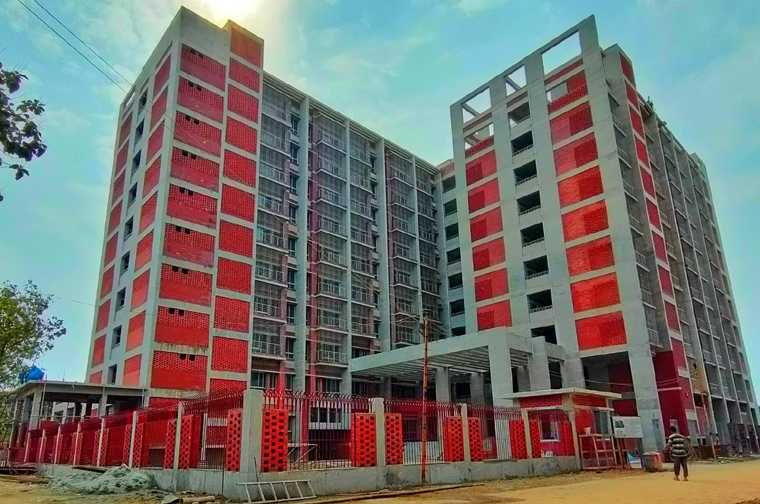
By Osman Gani Rashel
SAVAR, March 12, 2023 (BSS) - Jahangirnagar University (JU) is going to get back its cent percent residential status thanks 'JU Further Development Project' being implemented by the government to ensure accommodation facilities for all, specially teachers and students, on the campus.
Once it was the country's first university having accommodation capacity for teachers and students but it started losing such character with launching of new departments and institutions allowing more students and teaching-support staff on the campus.
The accommodation crisis became acute especially after 2010 as Law Faculty and many departments, including Journalism and Media Studies, Fine Arts, Biochemistry and Genetic Engineering, Public Health and Informatics, three departments of business faculty, were launched between 2010 and 2012 without arrangement for new students' accommodation.
Later, Institute of Remote Sensing and GIS and Bangabandhu Institute of Comparative Literature and Culture were also opened.
"We are working to make a model university ensuring all sorts of facilities for conducting academic, research and administrative activities, and accommodation for all so everything from nutrient food to research materials can be available on the campus," JU Vice Chancellor (VC) Professor Dr Nurul Alam told BSS.
A development scheme titled 'JU Further Development Project' is being implemented involving Taka 1445.36 crore to achieve the target by 2024, he said.
Six 10-storey student dormitories -- three for male and three for female-- are being constructed under the project to put a sustainable end to the accommodation crisis.
"We have already inaugurated two newly constructed dormitories as construction work of the halls was completed in January this year. Two more halls out of six are expected to be inaugurated by this month," said Professor Alam.
According to officials, JU started its journey in August 1970 as the lone full-fledged residential university of the country with only four departments, but it has lost this unique character over the years with gradual launching of new departments, institutes and faculties, creating an infrastructural crisis both for accommodation and academic activities.
Currently there are about 13,000 students and 710 teachers in the university. For both male and female students, there were 16 dormitories with a total of 8,278 seats before inaugurating the two new halls.
The VC said once the project is implemented, all the infrastructural problems will be solved, opening a smooth path for quality higher education.
According to the project details, apart from six student dormitories, 16 more new buildings, including a library, a lecture theater and examination hall, an administrative building, a sports complex, seven residential and five faculty and a playground for female students and extension of the Shaheed Rafiqi-Jabbar Hall will be constructed.
Al Beruni Hall playground, Selim Al Deen Muktamancha and Zahir Raihan Auditorium will also be renovated under the remaining two phases of the project by December 2024.
Besides, a circular transportation system will be launched inside the university campus following the 'Business district model' to facilitate movement for the students with arranging adequate vehicles.
A minibus, a double cabin pick-up and two ambulances will be procured under the scheme.
Ten deep tube-wells will be installed to extend the water line and 22 new transformers will be set up for extension of electricity lines on the campus.
The vice chancellor, however, inaugurated the construction work of more 14 establishments under the second phase of the project on June 9 last year.
Professor Alam said all the student dormitories, faculty buildings and residential towers for teachers and employees will be well equipped with modern facilities including lifts.
Responding to a question on whether the massive development project will have any adverse impact on the environment and the biodiversity on the campus, the VC said, "Any development project may cause some natural damages. But we have to find a comprehensive way for moving forward keeping the environment and the natural things intact".
During project design, the JU authority considered the environmental issue, Professor Alam said, adding, "Even then it (the project) might have caused a little bit of temporary damage to the environment mainly for cutting down some trees. But, we hope to recover the loss by planting new saplings soon".
Member of the Central Monitoring Committee (1st phase) of the project Professor Bashir Ahmed said the work of the project is going on in a faster mood.
"We hope the project will be completed by the stipulated time," he said, adding once the project is completed, a radical change will take place in the main three sectors-- academic, residential and administrative-- of the university.
Professor Bashir, also member secretary of JU Bangabandhu Shikkhok Parishad, said completion of the project will help upheld the cent percent residential status of the university, along with solving all other problems like infrastructural shortage and facilitating the research and academic activities.